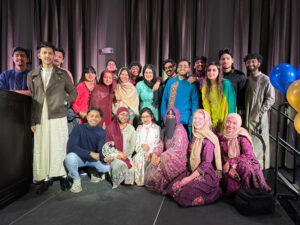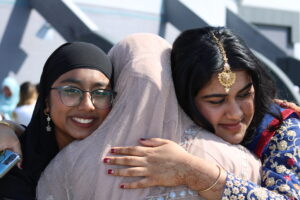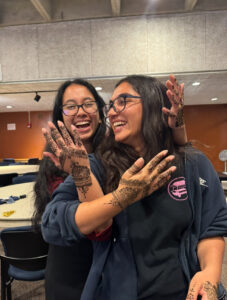Ramadan has always been a special time for me because it brings my family together. At home, we would gather to break our fast, pray, and share stories late into the night. Family plays a big role during Ramadan because they remind us of love, patience, and gratitude. Islam also teaches the importance of community, or ummah, which gives Muslims a sense of belonging and support. But during my first year on campus, it wasn’t easy to find that same sense of familiarity. Being in a new place, surrounded by new faces, made it hard to know where to turn or how to rebuild that feeling of connection I was used to at home.
One of the most prominent challenge was the food. At home, I was used to the smells and tastes of iftar (the meal to break a fast): homemade fritters, fresh fruit, and dishes passed down through generations. On campus, the dining hall now offers basic options, where you can even send your recipe to the Muslim Student Association (MSA) and they will coordinate with dining for undergraduate students to have access to these meals. But the time when I first came on campus, this was not available. I am ever so thankful for the iftar boxes from the Islamic Center of Rochester (ICR), but it was a kind of cultural shock, realizing that the food I craved, after 10-14 hours of fasting, wasn’t easily available. Sometimes, I found myself missing not just the meals, but the care and tradition that came with them. Even simple things, like hearing the call to prayer or sitting together on the floor to eat, were suddenly missing, making the first Ramadan away from family feel even more distant.
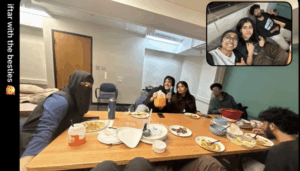 Still, we soon realized how powerful food could be in making a place feel like home. So even with the difficulties, my friends and I tried to make it work, and I will say that we were pretty successful. We would gather in the little community kitchen of Susan B. Anthony Hall, cooking up homemade meals and sharing them during weekly iftars; trying to keep the group together as much as possible. One person would cut the vegetables, carefully chopping onions, peppers, and everything needed, sitting at the small table by the stove. Another would be setting up the lounge, pushing tables together so we could all sit as one big group. Someone else would carry glasses of water and cups for everyone, while another carefully mixed everything needed for the said dishes. The final touch was whoever stood by the stove, stirring and cooking everything, browning to perfection. It wasn’t easy – the kitchen was small, and we were all ju
Still, we soon realized how powerful food could be in making a place feel like home. So even with the difficulties, my friends and I tried to make it work, and I will say that we were pretty successful. We would gather in the little community kitchen of Susan B. Anthony Hall, cooking up homemade meals and sharing them during weekly iftars; trying to keep the group together as much as possible. One person would cut the vegetables, carefully chopping onions, peppers, and everything needed, sitting at the small table by the stove. Another would be setting up the lounge, pushing tables together so we could all sit as one big group. Someone else would carry glasses of water and cups for everyone, while another carefully mixed everything needed for the said dishes. The final touch was whoever stood by the stove, stirring and cooking everything, browning to perfection. It wasn’t easy – the kitchen was small, and we were all ju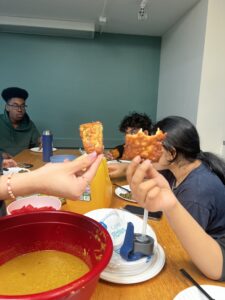 ggling schoolwork (most of us were also first generation, so we didn’t know what to expect) – but we did our best. Those nights became a way for us to hold onto tradition, support each other, and create a small piece of home, even when we were far away from our families.
ggling schoolwork (most of us were also first generation, so we didn’t know what to expect) – but we did our best. Those nights became a way for us to hold onto tradition, support each other, and create a small piece of home, even when we were far away from our families.
Personally, in addition to making food from home with my friends, I also found more familiarity on campus by getting involved with the MSA later in Ramadan. They were the ones who arranged iftar boxes from the ICR, making sure students like me had a meal ready even on our busiest days. The MSA also set up a space for us to gather after picking up our food, so we could sit together and break our fast as a group. Joining them gave me a sense of belonging I didn’t expect at first. It reminded me that even though I was away from my family, there was still a caring community here, waiting to welcome me. They were also the ones who hosted henna night every year, the night before Eid, so that all the sisters could get together and apply henna on one another. For me, henna during Eid is no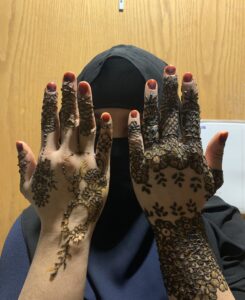 t just about artwork; it’s about tradition. And celebrating traditions with a community, such as henna nights and making home cooked meal an hour or two before iftar, is what truly makes a place feel like home.
t just about artwork; it’s about tradition. And celebrating traditions with a community, such as henna nights and making home cooked meal an hour or two before iftar, is what truly makes a place feel like home.
What made MSA even more special and convenient for me as a Muslim student was how much thought and care they put into making Ramadan easier to observe on campus. For example, instead of having to travel all the way to the Islamic Center of Rochester (ICR) late at night for taraweeh prayers, MSA arranged a space for us right on campus in the Interfaith Chapel. This made it so much easier to join the prayer with friends and feel that strong sense of community, even after a long day of classes. It felt like having a little piece of home just steps away from my dorm. MSA also understood the small but important challenges, like eating suhoor in the early morning hours. Since no dining halls open at 4 a.m., they coordinated with dining services to provide suhoor packages to students. Having those meals ready helped so much –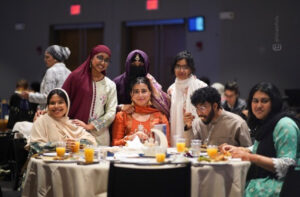 not only did it fill a practical need, but it also reminded me that I wasn’t alone in this experience. Ramadan on campus could have felt isolating, but thanks to these thoughtful efforts, it felt more manageable and even joyful. Another highlight were the community iftars MSA organized on weekends. In the past, these gatherings would be simple affairs with the campus chaplain cooking for everyone. But recently, other student organizations have reached out to collaborate, bringing more diversity to the food and the experience. This meant that during those weekend iftars, we could share a wider variety of dishes and stories, making the gatherings feel richer and more inclusive. It was beautiful to see different cultures come together through food and faith, deepening the sense of belonging on campus.
not only did it fill a practical need, but it also reminded me that I wasn’t alone in this experience. Ramadan on campus could have felt isolating, but thanks to these thoughtful efforts, it felt more manageable and even joyful. Another highlight were the community iftars MSA organized on weekends. In the past, these gatherings would be simple affairs with the campus chaplain cooking for everyone. But recently, other student organizations have reached out to collaborate, bringing more diversity to the food and the experience. This meant that during those weekend iftars, we could share a wider variety of dishes and stories, making the gatherings feel richer and more inclusive. It was beautiful to see different cultures come together through food and faith, deepening the sense of belonging on campus.
You see, community for us is not just about gathering for prayers or meals; it’s about caring for each other’s needs, sharing struggles, and creating a home away from home. Especially during Ramadan, when faith and togetherness become so deeply connected, having that support made all the difference in helping me feel grounded and connected, even far from my family. So, I guess what I am trying to convey is that do not come here expecting a readymade community for yourself, but do not shy away from the opportunities this place offers you to get involved. There is some work that is required from your end and it is highly possible, but once you accomplish it; you’ll find yourself families, that you may not be related to by blood, but would have your back through thick or thin. And that is exactly what it means to be a part of an ummah (nation); you act as one body, where if one limb gets hurt, you – being another limb (apart of the nation) – would feel it too, even if you do not know each other.


